2021-2022学年人教版英语中考复习之九年级 Units 9、10课件(共80张PPT)
文档属性
| 名称 | 2021-2022学年人教版英语中考复习之九年级 Units 9、10课件(共80张PPT) | 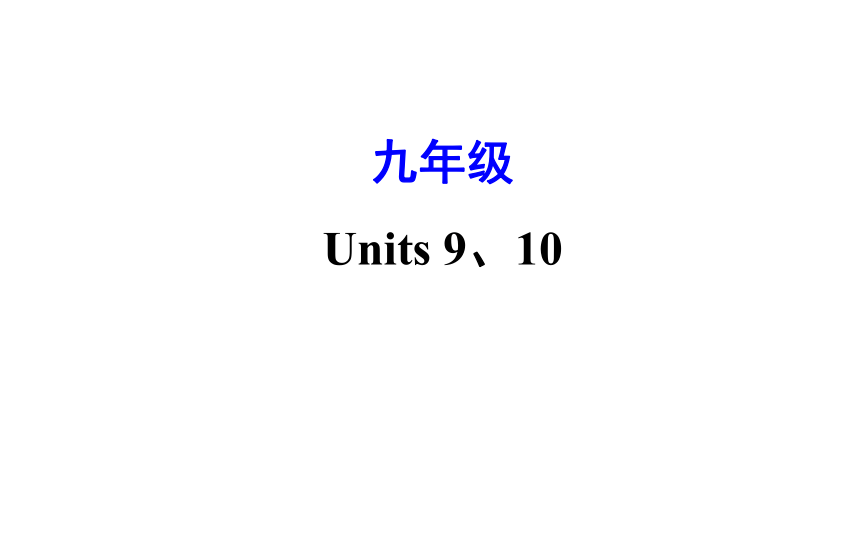 | |
| 格式 | ppt | ||
| 文件大小 | 1.5MB | ||
| 资源类型 | 教案 | ||
| 版本资源 | 人教新目标(Go for it)版 | ||
| 科目 | 英语 | ||
| 更新时间 | 2021-07-28 16:23:52 | ||
图片预览

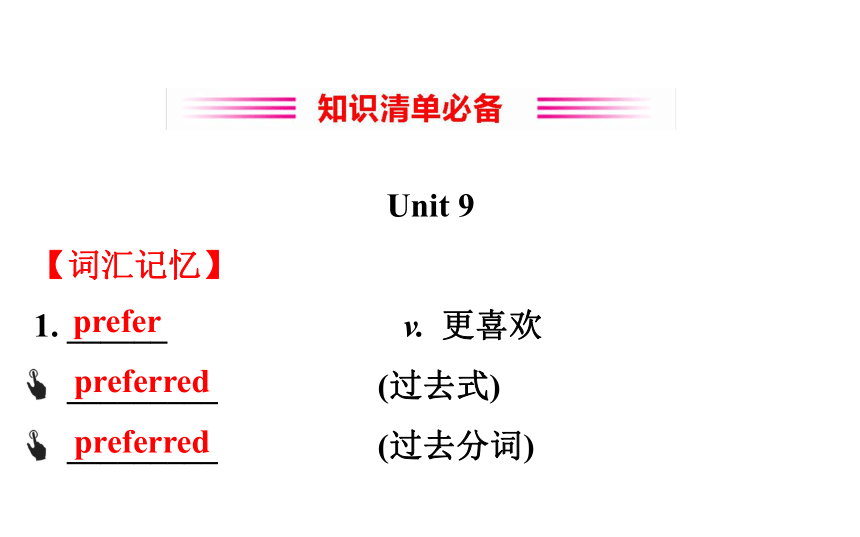
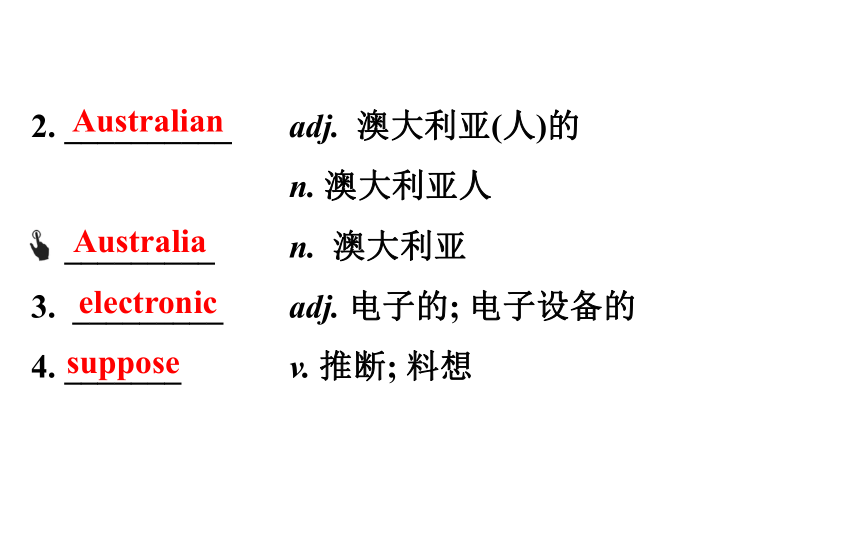
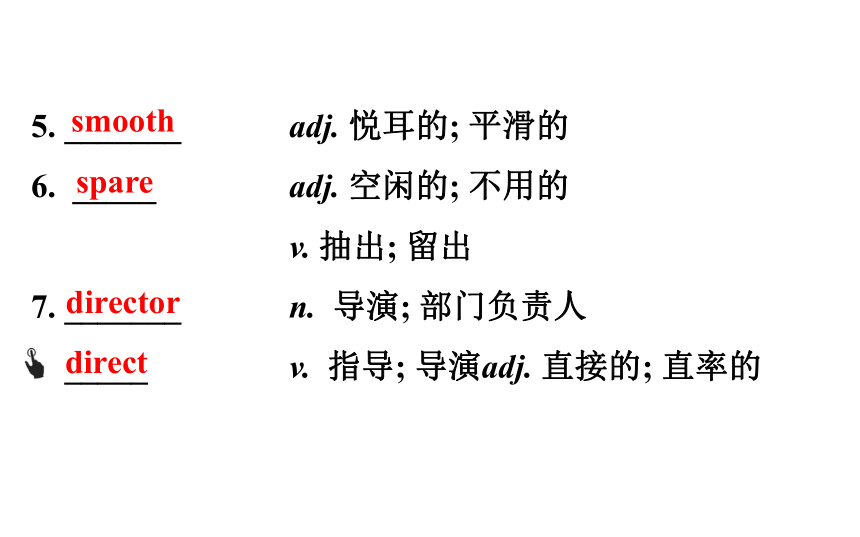
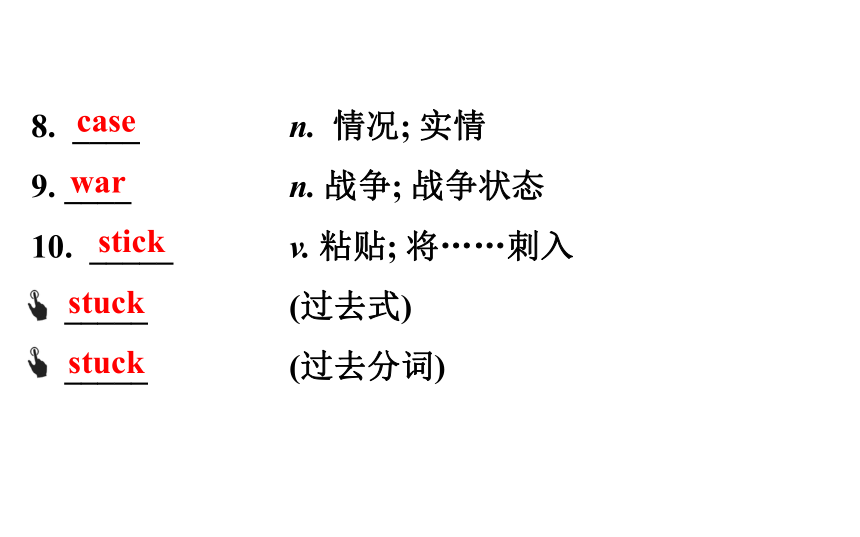
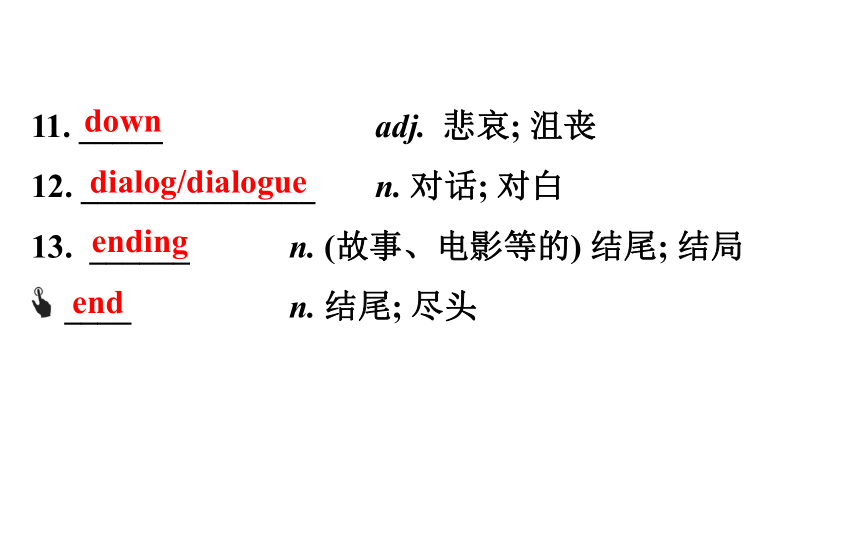
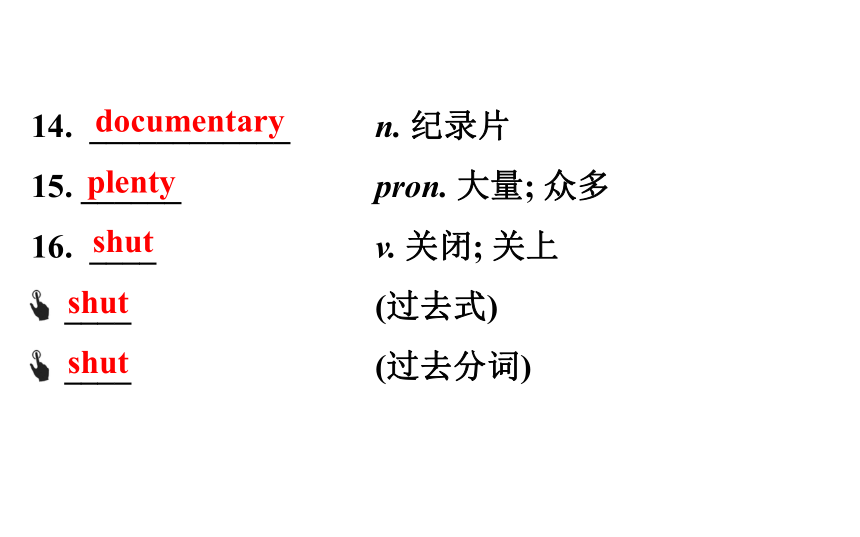
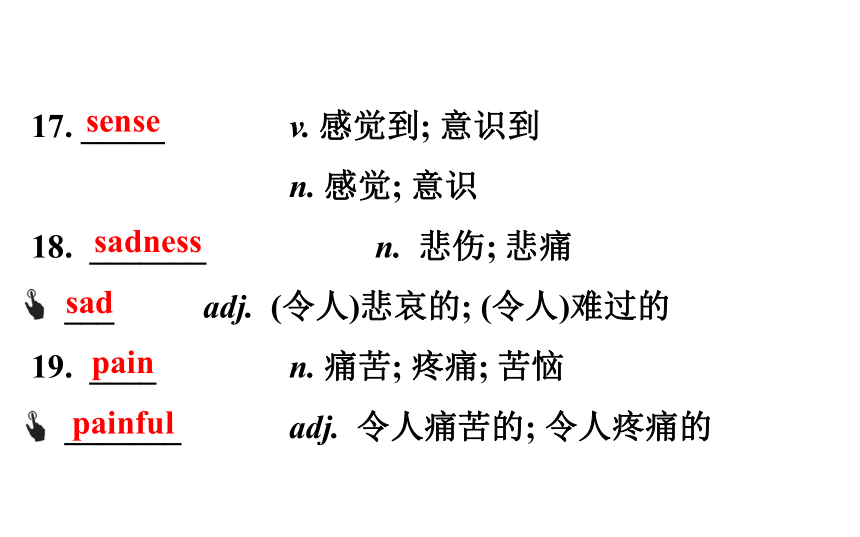
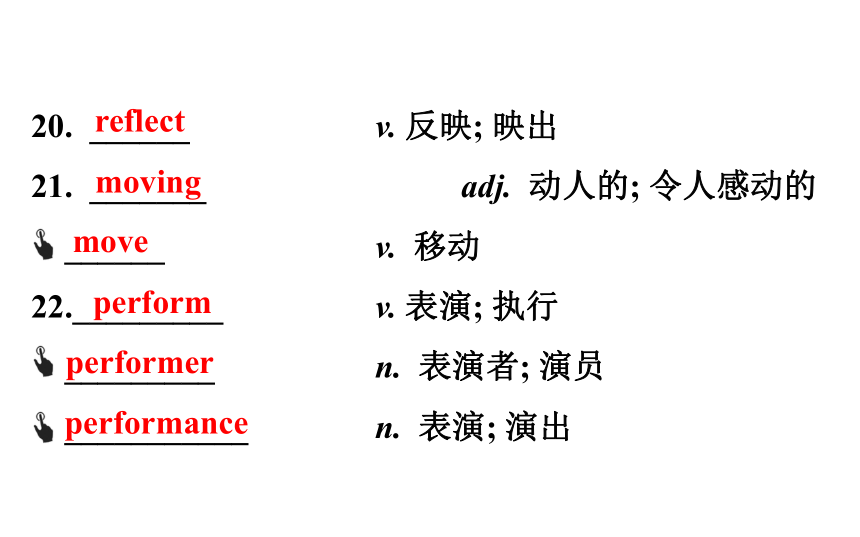
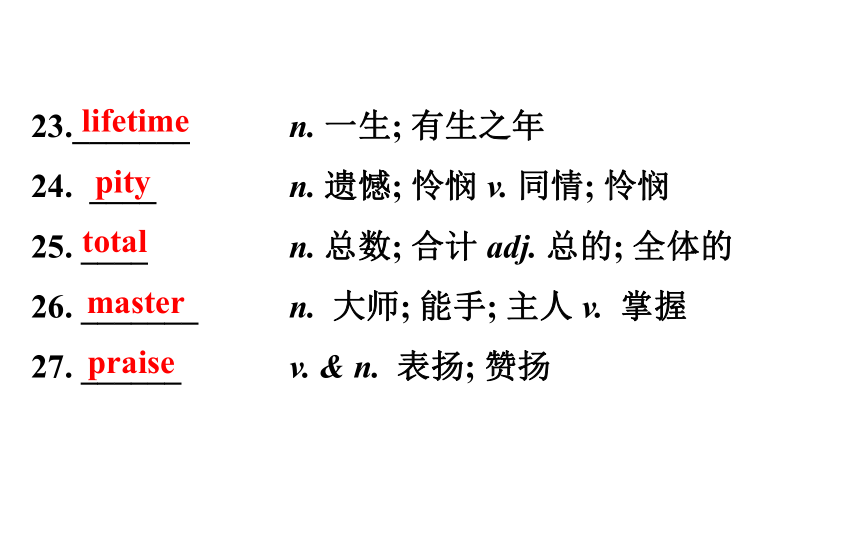
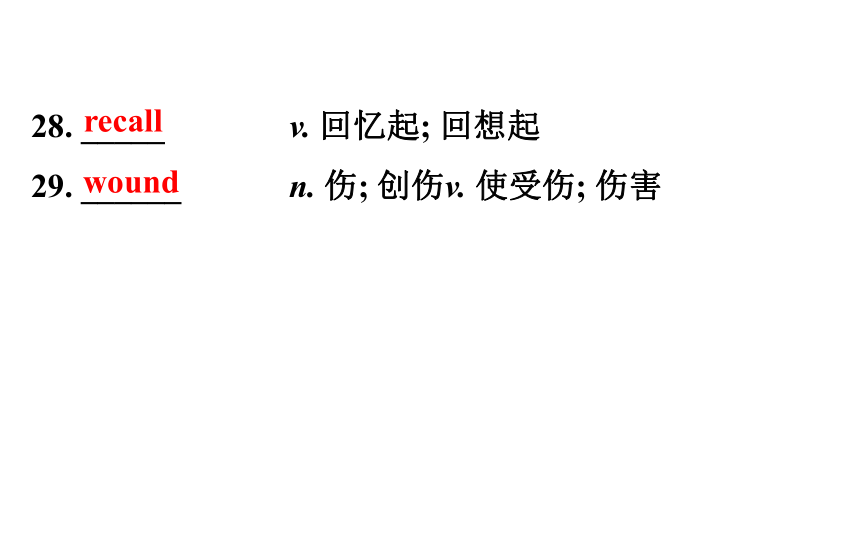
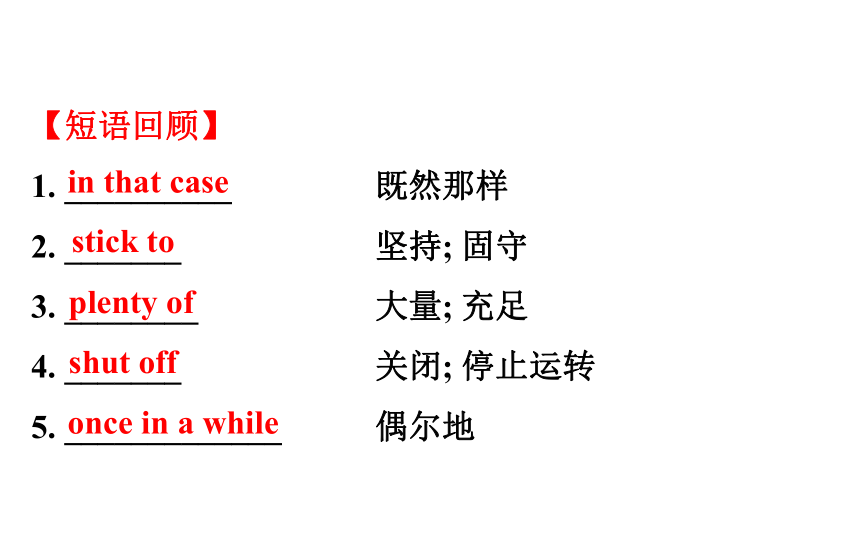
文档简介
九年级
Units 9、10
Unit 9
【词汇记忆】
1. ______ v. 更喜欢
_________? (过去式)
_________? (过去分词)
prefer
preferred
preferred
2. __________ adj. 澳大利亚(人)的
n. 澳大利亚人
_________ n. 澳大利亚
3. _________ adj. 电子的; 电子设备的 ?
4. _______ v. 推断; 料想
Australian
Australia
electronic
suppose
5. _______ adj. 悦耳的; 平滑的
6. _____ adj. 空闲的; 不用的?
v. 抽出; 留出
7. _______ n. 导演; 部门负责人
_____ v. 指导; 导演adj. 直接的; 直率的
smooth
spare
director
direct
8. ____ n. 情况; 实情?
9. ____ n. 战争; 战争状态
10. _____ v. 粘贴; 将……刺入?
_____? (过去式)
_____? (过去分词)
case
war
stick
stuck
stuck
11. _____? adj. 悲哀; 沮丧
12. ______________ n. 对话; 对白
13. ______ n. (故事、电影等的) 结尾; 结局 ?
____ n. 结尾; 尽头
down
dialog/dialogue
ending
end
14. ____________ n. 纪录片?
15. ______ pron. 大量; 众多
16. ____ v. 关闭; 关上
____? (过去式)
____? (过去分词)
documentary
plenty
shut
shut
shut
17. _____ v. 感觉到; 意识到
n. 感觉; 意识
18. _______ n. 悲伤; 悲痛
___ adj. (令人)悲哀的; (令人)难过的
19. ____ n. 痛苦; 疼痛; 苦恼
_______ adj. 令人痛苦的; 令人疼痛的
sense
sadness
sad
pain
painful
20. ______ v. 反映; 映出?
21. _______ adj. 动人的; 令人感动的
______ v. 移动
22._________ v. 表演; 执行?
_________? n. 表演者; 演员
___________ n. 表演; 演出
reflect
moving
move?
perform
performer
performance
23._______? n. 一生; 有生之年
24. ____ n. 遗憾; 怜悯 v. 同情; 怜悯?
25. ____? n. 总数; 合计 adj. 总的; 全体的
26. _______ n. 大师; 能手; 主人 v. 掌握
27. ______? v. & n. 表扬; 赞扬
lifetime
pity
total
master?
praise
28. _____? v. 回忆起; 回想起
29. ______ n. 伤; 创伤v. 使受伤; 伤害
recall
wound
【短语回顾】
1. __________ 既然那样?
2. _______ 坚持; 固守?
3. ________ 大量; 充足?
4. _______ 关闭; 停止运转?
5. _____________ 偶尔地?
in that case
stick to
plenty of
shut off
once in a while
6. ____________ 在空闲时间里?
7. _______ 总共?
8. ___________ 使欢呼?
9. ______ 及时?
10. ___________ 结婚?
in spare time
in total
cheer up
in time
get married
【句式填写】
1. 我更喜欢有优美歌词的音乐。
I prefer music____ ___ _____ _____.
that
has
great
lyrics
2. ——你喜欢哪种音乐?
——我喜欢能随着跳舞的音乐。
—_____ ____ __ music do you like?
—I like music ____ I can dance to.
What
kind
of
that
3. 卡门喜欢演奏不同音乐的音乐家。
Carmen likes musicians ____ ____ different kinds of
______.
4. 我更喜欢给我一些思索的电影。
I prefer ______ ____ ____ me something to think
about.
who
play
music
movies
that
give
5. 当一些人坚持只看一种电影的时候, 我喜欢根据那
天的心情看不同种类的(电影)。
While some people _____ __ only one kind of movie, I
like to watch different kinds _________ ___ ____ _ ___
that day.
stick
to
depending
on
how
I
feel
6. 大笑两个小时是一种放松的好方式。
________________________________________?
7. 它是我曾经听过的最动人的乐曲之一。
It was ____ __ ___ _____ _______ ______ of music ____
____ ____ ______.
Laughing for two hours is a good way to relax.
one
of
the
most
moving
pieces
that
I’ve
ever
heard
8. 他继续在街上唱歌演奏(音乐)。
He _________ __ ____ and ____ on the streets.
9. 令人遗憾的是总共只有六首乐曲被录制下来。
__ __ __ ____ ____ only six pieces of music in total were
recorded.
continued
to
sing
play
It
is
a
pity
that
Unit 10
【词汇记忆】
1. _______ n. 风俗; 习俗?
2. ____? v. & n. 鞠躬?
3. ____ v. & n. 亲吻; 接吻
4. _____ v. 和……打招呼; 迎接
________ n. 问候
custom
bow
kiss
greet
greeting?
5. _______ adj. 放松的; 自在的 ?
_____ v. 放松; 休息
________ adj. 轻松的; 令人放松的
6. _____ v. 重视; 珍视n. 价值
________ adj. 贵重的; 很有用的; 宝贵的
relaxed
relax?
relaxing?
value
valuable?
7. ______ n. 首都; 国都
8. _____? n. 正午; 中午
9. ____ adj. 很生气; 疯的
10. ________? n. 护照
11. _____ n. 粉笔
capital
noon
mad
passport
chalk
12. ___________? n. 黑板?
13. ________? adj. 北方的; 北部的
______ n. 北; 北方 adj. 北方的
14. _____ n. 海岸; 海滨
blackboard
northern
north?
coast
15. ______ n. 季; 季节
16. ______? v. 敲; 击 n. 敲击声; 敲击
17. _______ adj. 东方的; 东部的
____? adj. 东方的; 东部的 adv. 向东n. 东方
18. ______? adj. 值得; 有……价值(的)
19. _______? n. 方式; 方法(pl. )礼貌; 礼仪
season
knock
eastern
east
worth
manner
20. ______ adj. 空的; 空洞的
___? (反义词)满的; 忙的
21._____ adj. 基本的; 基础的
22. ________ n. & v. 交换
23. _______ adj. 十几岁的; 青少年的
________ n. 青少年
empty
full
basic
exchange
teenage
teenager?
24. _____________ n. (外)孙女
25. _______ v. 表现; 举止
_________ n. 举止
26. ______ prep. 除……之外 conj. 除了; 只是?
27. __________ n. 建议
_______ v. 建议; 提议
granddaughter
behave
behavior?
except
suggestion
suggest?
【短语回顾】
1. _______ 顺便访问?
2. _______ 毕竟?
3. _______ 大动肝火?
4. _____________ 作出努力?
5. __________ 把……擦掉
drop by
after all
get mad
make an effort
clean. . . off
6. _______ 脱衣; (飞机等) 起飞?
7. _________________ 特地; 格外努力?
8. ___________________ 使(某人)感到宾至如归?
9. __________ 习惯于?
take off
go out of one’s way
make. . . feel at home
get used to
【句式填写】
1. ——在你们国家, 当你初次遇见某人的时候你应当怎
么做?
——你应当握手。
—In your country, _____ are you ________ __ ___ when
you meet someone for the first time?
—You’re supposed to shake hands.
what
supposed
to
do
2. 在美国, 他们被期待握手。
In the United States, _______ ________ __ shake hands.
3. 我遇见了一个叫佐藤的日本男孩, 当我一伸出手的
时候, 他却鞠躬了。
I met a Japanese boy _____ Sato, and __ ____ __ I held
out my hand, he bowed.
they’re
expected
to
called
as
soon
as
4. 那就是日本人被期待相互打招呼的方式。
______ ____ people in Japan are expected to greet each
other.
5. 在我们那个地方, 我们的时间观念比较随意。
______ I’m from, _____ pretty _______ about time.
That’s
how
Where
we’re
relaxed
6. 在瑞士, 守时是非常重要的。
In Switzerland, ___ _________ __ ___ on time.
7. 我最大的挑战是学习如何在餐桌上举止得体。
My biggest challenge is learning ____ __ _______ at the
dinner table.
it’s
important
to
be
how
to
behave
1. I prefer music that has great lyrics. 我更喜欢歌词优美的音乐。(Unit 9, P65)
? prefer v. 更喜欢
【测考点】
(1)我喜欢爵士乐胜过摇滚乐。
I ______ jazz __ rock music.
(2)When I am free, I prefer _______(cook)myself to
______(eat) out. .
prefer
to
cooking
eating
( )(3)(2019·安顺中考) —What a heavy rain!
—So it is. I prefer _________rather than _________
on such a rainy day. ?
A. to go out, staying at home
B. staying at home, go out
C. going out, stay at home
D. to stay at home, go out
D
【巧归纳】prefer的常见三种结构
【提示】prefer的过去式和过去分词要双写字母r, 分别为preferred, preferred。
2. I suppose I’ll just listen to this new CD I bought. 我估计就是听听我新买的激光唱片吧。(Unit 9, P66)
? suppose v. 推断 ; 料想
【测考点】
(1)用括号中动词的适当形式填空。
①Chinese are supposed ________(shake) hands when
they meet for the first time. ?
②Alice supposed her sister _____(be) in the park. ?
③It __________(suppose) that Miss Li will give us a
report this Friday. .?
to shake
to be
is supposed
(2)I suppose that the boy will choose the first one. (改为
否定句)
_____________________________________________?
I don’t suppose that the boy will choose the first one.
( )(3)(2019·兰州中考) We are supposed
_________some housework with our parents when we
have free time. ?
A. to share B. sharing
C. shared D. share
A
【巧归纳】
suppose 后跟宾语从句, 句式结构为I/We suppose that. . . , 其否定结构为I/We don’t suppose that. . . , 从句为肯定形式。
I suppose it’s his fault. 我认为那是他的过错。
【拓展】suppose常用固定搭配
3. . . . but it is worth the trouble if you want to understand another culture. ?
但如果你想了解另一种文化, 这点麻烦是值得的。(Unit 10, P76)
?worth adj. 值得; 有……价值(的)
( )(1)(2018·泰州中考) Amazing China(《厉害
了, 我的国》)wins high praise from the public. I think
the documentary is well worth _________. ?
A. watch B. to watch
C. watching D. watched
C
(2)犯不上跟她生气。
She’s not ______________________. ?
worth getting angry with
【巧归纳】
worth形容词, “有价值的”。常用于:
(1)be worth sth. (价格)“值……”。如:
The house is worth 600, 000 yuan now.
这套房子如今价值60万元。
(2)be worth doing “……值得做”。
4. Another example is that you’re not supposed to eat anything with your hands except bread, not even fruit. 另一个例子是除了面包外, 你不应该用手拿东西吃, 甚至水果也不行。(Unit 10, P78)
? except prep. 除……之外conj. 除了; 只是
【测考点】
( )(1)_________ Journey to the West, she has also
read Little Women. ?
A. Besides B. But C. Except D. Among
A
( )(2)—George, how can you prove the earth is
round?
—I can’t, sir. _________, I never said it was. ?
A. Except B. Unless
C. Besides D. Including
C
(3)(2017·常州中考)Mary goes to work every day
______(除……之外)Sundays. .
except
【巧归纳】 如何“除去”
except
作介词, 意为“除了……之外”, 强调不包括部分
besides
作介词, 意为“除……之外还有”, 强调包括部分
【警示】①except 作连词, 意为“除了; 只是”。
I didn’t tell him anything except that I needed help. 我什么都没告诉他, 只是说我需要帮助。
②besides作副词, 意为“此外; 而且”。
I don’t really want to go. Besides, it’s too late now. 我真的不想去。而且现在太晚了。
语法点 定语从句
→见语法精讲强化篇P215
考点1: 定语从句的关系词: that/which/who/whom/when/where。
考点2: 关系词只能用that的情况。
考点3: 关系词只能用which的情况。
【即时冲关】
Ⅰ. 用who, whom, whose, which或that填空
1. A clock is a machine __________ tells people the
time.
2. The panda is a kind of animal __________ can be
found only in China.
that/which
that/which
3. April 1st is the day __________ is called Fool’s Day
in the West.
4. Where is the woman ______ watch was stolen
yesterday?
5. The woman ______________ you visited last week is
a famous writer. .
which/that
whose
whom/who/that
Ⅱ. 把下列每组句子改为含定语从句的复合句(每空词
数不限)
1. I’ll never forget the farm. I visited it in 2003.
I’ll never forget the farm _________________in 2003. ?
that/which I visited
2. The building is a middle school. It stands near the
post office.
The building ________________near the post office is
a middle school. ?
3. The man teaches us English. He comes from Hainan.
The man ________________________comes from
Hainan. ?
that/which stands
who/that teaches us English
4. The book is interesting. You lent it to me yesterday.
The book ______________________yesterday is
interesting. .?
5. My grandfather likes this kind of music. It sounds
relaxing.
My grandfather likes music __________________. ?
that/which you lent to me
that sounds relaxing
话题——风俗习惯
考查角度
1. 介绍人们的饮食习惯;
2. 介绍人们的行为举止;
3. 待人接物的习俗等。
考查频次
★★★★★
【写作佳句】
亮点句式
1. The biggest challenge is learning _______________
______________. ?
最大的挑战是学习用餐的礼仪规范。
how to behave at
the dinner table
2. You are supposed to ________________________
______________________. ?
当你首次遇见某人时, 你应当握手。
3. It’s rude/impolite _________________________
_________. 用你的筷子指着别人是不礼貌的。?
shake hands when you meet
someone for the first time
to point at anyone with your
chopsticks
4. It’s a good idea to ____________________. ?
谈论天气是个好主意。
talk about the weather
万能句式
1. When you travel to other countries, please respect their customs.
当你到别的国家旅游, 请尊重他们的风俗。
2. When in Rome, do as the Romans do. 入乡随俗。
3. Different countries have different ideas about manners. 不同的国家有不同的礼仪观念。
4. It is not polite to talk with your mouth full of food.
嘴里塞满食物说话是不礼貌的。
【典题研析】
(2018·兰州中考) 假设你是李华, 今天正逢端午节, 你的英国笔友Jack对中国传统文化很感兴趣, 写信向你询问端午节的有关情况。请你根据以下内容提示, 给他写一封回信。
1. 中国的传统节日之一, 已有2 000多年的历史(the Dragon Boat Festival; one of the Chinese traditional festivals; two thousand years of history)。
2. 为了纪念著名诗人屈原(honor the great poet Qu Yuan)。
3. 中国南方有赛龙舟的习俗(Dragon Boat races)。
4. 家人团聚吃粽子和其他美食(eat Zongzi and other delicious food)。
5. 有三天假期, 可以外出旅游(a 3-day holiday)。
要求: 1. 80词左右, 书信格式。
2. 内容合理, 要点齐全; 句子及篇章结构正确、连贯; 书写规范。
注意: 不得出现学校, 姓名等个人信息(除所给身份外)。
Step 1?“四定”审题
(1)定文体: 介绍中国的端午节习俗, 文体为_______。
(2)定人称: 给外国朋友写信, 介绍我们自己的风土人
情, 应该以___________为主。
(3)定时态: 介绍风俗习惯, 因此涉及的活动多用_____
_______。
说明文
第一人称we
一般
现在时
(4)定要点: 根据写作提示, 写作内容包括: ①叙述端午节的历史; ②介绍端午节的来源; ③介绍庆贺端午节的习惯, 主要是饮食及活动。
Step 2?段落谋篇
第一段: 点明主题。
既然你对中国的端午节感兴趣, 让我给你介绍一下吧。
(interest; introduce)
_______________________________________________
______________________?
Since you’re so interested in the Dragon Boat Festival,
let me introduce it to you.
第二段: 主题段落, 介绍节日历史以及相关活动。
1. 它是中国的传统节日之一, 有大约两千年的历史。
(one of. . . , traditional festivals; 可用定语从句)
______________________________________________
_________________________________
It is one of the Chinese traditional festivals which has
about two thousand years of history. ?
2. 这个节日是为了纪念伟大的诗人屈原。(honor the
great poet Qu Yuan)
_____________________________________________
______?
The festival is celebrated to honor the great poet Qu
Yuan.
3. 在那一天, 人们经常和家人聚在一起吃粽子和其他
美味的食物。(with their family ; 注意用动词不定式to
eat Zongzi作目的状语)
__________________________________________
_______________________________________?
On that day, people often get together with their
family to eat Zongzi and other delicious food.
4. 在中国南方, 人们通常举办龙舟赛。
_____________________________________________
_________________?
5. 此外, 在节日期间我们还有三天的假期。(注意使用
besides, 使得前后照应)
__________________________________________
_______?
In southern parts of China, people usually have the
Dragon Boat races.
Besides, we also have a 3-day holiday during the
festival.
第三段: 表达愿望, 希望与朋友一起过端午节。
希望有一天你来到中国享受端午节。(wish sb. to do)
_______________________________________________
_________
Wish you to come to China and enjoy the Dragon Boat
Festival. ?
Step 3?润色成篇
___________________________________________
___________________________________________
___________________________________________
Units 9、10
Unit 9
【词汇记忆】
1. ______ v. 更喜欢
_________? (过去式)
_________? (过去分词)
prefer
preferred
preferred
2. __________ adj. 澳大利亚(人)的
n. 澳大利亚人
_________ n. 澳大利亚
3. _________ adj. 电子的; 电子设备的 ?
4. _______ v. 推断; 料想
Australian
Australia
electronic
suppose
5. _______ adj. 悦耳的; 平滑的
6. _____ adj. 空闲的; 不用的?
v. 抽出; 留出
7. _______ n. 导演; 部门负责人
_____ v. 指导; 导演adj. 直接的; 直率的
smooth
spare
director
direct
8. ____ n. 情况; 实情?
9. ____ n. 战争; 战争状态
10. _____ v. 粘贴; 将……刺入?
_____? (过去式)
_____? (过去分词)
case
war
stick
stuck
stuck
11. _____? adj. 悲哀; 沮丧
12. ______________ n. 对话; 对白
13. ______ n. (故事、电影等的) 结尾; 结局 ?
____ n. 结尾; 尽头
down
dialog/dialogue
ending
end
14. ____________ n. 纪录片?
15. ______ pron. 大量; 众多
16. ____ v. 关闭; 关上
____? (过去式)
____? (过去分词)
documentary
plenty
shut
shut
shut
17. _____ v. 感觉到; 意识到
n. 感觉; 意识
18. _______ n. 悲伤; 悲痛
___ adj. (令人)悲哀的; (令人)难过的
19. ____ n. 痛苦; 疼痛; 苦恼
_______ adj. 令人痛苦的; 令人疼痛的
sense
sadness
sad
pain
painful
20. ______ v. 反映; 映出?
21. _______ adj. 动人的; 令人感动的
______ v. 移动
22._________ v. 表演; 执行?
_________? n. 表演者; 演员
___________ n. 表演; 演出
reflect
moving
move?
perform
performer
performance
23._______? n. 一生; 有生之年
24. ____ n. 遗憾; 怜悯 v. 同情; 怜悯?
25. ____? n. 总数; 合计 adj. 总的; 全体的
26. _______ n. 大师; 能手; 主人 v. 掌握
27. ______? v. & n. 表扬; 赞扬
lifetime
pity
total
master?
praise
28. _____? v. 回忆起; 回想起
29. ______ n. 伤; 创伤v. 使受伤; 伤害
recall
wound
【短语回顾】
1. __________ 既然那样?
2. _______ 坚持; 固守?
3. ________ 大量; 充足?
4. _______ 关闭; 停止运转?
5. _____________ 偶尔地?
in that case
stick to
plenty of
shut off
once in a while
6. ____________ 在空闲时间里?
7. _______ 总共?
8. ___________ 使欢呼?
9. ______ 及时?
10. ___________ 结婚?
in spare time
in total
cheer up
in time
get married
【句式填写】
1. 我更喜欢有优美歌词的音乐。
I prefer music____ ___ _____ _____.
that
has
great
lyrics
2. ——你喜欢哪种音乐?
——我喜欢能随着跳舞的音乐。
—_____ ____ __ music do you like?
—I like music ____ I can dance to.
What
kind
of
that
3. 卡门喜欢演奏不同音乐的音乐家。
Carmen likes musicians ____ ____ different kinds of
______.
4. 我更喜欢给我一些思索的电影。
I prefer ______ ____ ____ me something to think
about.
who
play
music
movies
that
give
5. 当一些人坚持只看一种电影的时候, 我喜欢根据那
天的心情看不同种类的(电影)。
While some people _____ __ only one kind of movie, I
like to watch different kinds _________ ___ ____ _ ___
that day.
stick
to
depending
on
how
I
feel
6. 大笑两个小时是一种放松的好方式。
________________________________________?
7. 它是我曾经听过的最动人的乐曲之一。
It was ____ __ ___ _____ _______ ______ of music ____
____ ____ ______.
Laughing for two hours is a good way to relax.
one
of
the
most
moving
pieces
that
I’ve
ever
heard
8. 他继续在街上唱歌演奏(音乐)。
He _________ __ ____ and ____ on the streets.
9. 令人遗憾的是总共只有六首乐曲被录制下来。
__ __ __ ____ ____ only six pieces of music in total were
recorded.
continued
to
sing
play
It
is
a
pity
that
Unit 10
【词汇记忆】
1. _______ n. 风俗; 习俗?
2. ____? v. & n. 鞠躬?
3. ____ v. & n. 亲吻; 接吻
4. _____ v. 和……打招呼; 迎接
________ n. 问候
custom
bow
kiss
greet
greeting?
5. _______ adj. 放松的; 自在的 ?
_____ v. 放松; 休息
________ adj. 轻松的; 令人放松的
6. _____ v. 重视; 珍视n. 价值
________ adj. 贵重的; 很有用的; 宝贵的
relaxed
relax?
relaxing?
value
valuable?
7. ______ n. 首都; 国都
8. _____? n. 正午; 中午
9. ____ adj. 很生气; 疯的
10. ________? n. 护照
11. _____ n. 粉笔
capital
noon
mad
passport
chalk
12. ___________? n. 黑板?
13. ________? adj. 北方的; 北部的
______ n. 北; 北方 adj. 北方的
14. _____ n. 海岸; 海滨
blackboard
northern
north?
coast
15. ______ n. 季; 季节
16. ______? v. 敲; 击 n. 敲击声; 敲击
17. _______ adj. 东方的; 东部的
____? adj. 东方的; 东部的 adv. 向东n. 东方
18. ______? adj. 值得; 有……价值(的)
19. _______? n. 方式; 方法(pl. )礼貌; 礼仪
season
knock
eastern
east
worth
manner
20. ______ adj. 空的; 空洞的
___? (反义词)满的; 忙的
21._____ adj. 基本的; 基础的
22. ________ n. & v. 交换
23. _______ adj. 十几岁的; 青少年的
________ n. 青少年
empty
full
basic
exchange
teenage
teenager?
24. _____________ n. (外)孙女
25. _______ v. 表现; 举止
_________ n. 举止
26. ______ prep. 除……之外 conj. 除了; 只是?
27. __________ n. 建议
_______ v. 建议; 提议
granddaughter
behave
behavior?
except
suggestion
suggest?
【短语回顾】
1. _______ 顺便访问?
2. _______ 毕竟?
3. _______ 大动肝火?
4. _____________ 作出努力?
5. __________ 把……擦掉
drop by
after all
get mad
make an effort
clean. . . off
6. _______ 脱衣; (飞机等) 起飞?
7. _________________ 特地; 格外努力?
8. ___________________ 使(某人)感到宾至如归?
9. __________ 习惯于?
take off
go out of one’s way
make. . . feel at home
get used to
【句式填写】
1. ——在你们国家, 当你初次遇见某人的时候你应当怎
么做?
——你应当握手。
—In your country, _____ are you ________ __ ___ when
you meet someone for the first time?
—You’re supposed to shake hands.
what
supposed
to
do
2. 在美国, 他们被期待握手。
In the United States, _______ ________ __ shake hands.
3. 我遇见了一个叫佐藤的日本男孩, 当我一伸出手的
时候, 他却鞠躬了。
I met a Japanese boy _____ Sato, and __ ____ __ I held
out my hand, he bowed.
they’re
expected
to
called
as
soon
as
4. 那就是日本人被期待相互打招呼的方式。
______ ____ people in Japan are expected to greet each
other.
5. 在我们那个地方, 我们的时间观念比较随意。
______ I’m from, _____ pretty _______ about time.
That’s
how
Where
we’re
relaxed
6. 在瑞士, 守时是非常重要的。
In Switzerland, ___ _________ __ ___ on time.
7. 我最大的挑战是学习如何在餐桌上举止得体。
My biggest challenge is learning ____ __ _______ at the
dinner table.
it’s
important
to
be
how
to
behave
1. I prefer music that has great lyrics. 我更喜欢歌词优美的音乐。(Unit 9, P65)
? prefer v. 更喜欢
【测考点】
(1)我喜欢爵士乐胜过摇滚乐。
I ______ jazz __ rock music.
(2)When I am free, I prefer _______(cook)myself to
______(eat) out. .
prefer
to
cooking
eating
( )(3)(2019·安顺中考) —What a heavy rain!
—So it is. I prefer _________rather than _________
on such a rainy day. ?
A. to go out, staying at home
B. staying at home, go out
C. going out, stay at home
D. to stay at home, go out
D
【巧归纳】prefer的常见三种结构
【提示】prefer的过去式和过去分词要双写字母r, 分别为preferred, preferred。
2. I suppose I’ll just listen to this new CD I bought. 我估计就是听听我新买的激光唱片吧。(Unit 9, P66)
? suppose v. 推断 ; 料想
【测考点】
(1)用括号中动词的适当形式填空。
①Chinese are supposed ________(shake) hands when
they meet for the first time. ?
②Alice supposed her sister _____(be) in the park. ?
③It __________(suppose) that Miss Li will give us a
report this Friday. .?
to shake
to be
is supposed
(2)I suppose that the boy will choose the first one. (改为
否定句)
_____________________________________________?
I don’t suppose that the boy will choose the first one.
( )(3)(2019·兰州中考) We are supposed
_________some housework with our parents when we
have free time. ?
A. to share B. sharing
C. shared D. share
A
【巧归纳】
suppose 后跟宾语从句, 句式结构为I/We suppose that. . . , 其否定结构为I/We don’t suppose that. . . , 从句为肯定形式。
I suppose it’s his fault. 我认为那是他的过错。
【拓展】suppose常用固定搭配
3. . . . but it is worth the trouble if you want to understand another culture. ?
但如果你想了解另一种文化, 这点麻烦是值得的。(Unit 10, P76)
?worth adj. 值得; 有……价值(的)
( )(1)(2018·泰州中考) Amazing China(《厉害
了, 我的国》)wins high praise from the public. I think
the documentary is well worth _________. ?
A. watch B. to watch
C. watching D. watched
C
(2)犯不上跟她生气。
She’s not ______________________. ?
worth getting angry with
【巧归纳】
worth形容词, “有价值的”。常用于:
(1)be worth sth. (价格)“值……”。如:
The house is worth 600, 000 yuan now.
这套房子如今价值60万元。
(2)be worth doing “……值得做”。
4. Another example is that you’re not supposed to eat anything with your hands except bread, not even fruit. 另一个例子是除了面包外, 你不应该用手拿东西吃, 甚至水果也不行。(Unit 10, P78)
? except prep. 除……之外conj. 除了; 只是
【测考点】
( )(1)_________ Journey to the West, she has also
read Little Women. ?
A. Besides B. But C. Except D. Among
A
( )(2)—George, how can you prove the earth is
round?
—I can’t, sir. _________, I never said it was. ?
A. Except B. Unless
C. Besides D. Including
C
(3)(2017·常州中考)Mary goes to work every day
______(除……之外)Sundays. .
except
【巧归纳】 如何“除去”
except
作介词, 意为“除了……之外”, 强调不包括部分
besides
作介词, 意为“除……之外还有”, 强调包括部分
【警示】①except 作连词, 意为“除了; 只是”。
I didn’t tell him anything except that I needed help. 我什么都没告诉他, 只是说我需要帮助。
②besides作副词, 意为“此外; 而且”。
I don’t really want to go. Besides, it’s too late now. 我真的不想去。而且现在太晚了。
语法点 定语从句
→见语法精讲强化篇P215
考点1: 定语从句的关系词: that/which/who/whom/when/where。
考点2: 关系词只能用that的情况。
考点3: 关系词只能用which的情况。
【即时冲关】
Ⅰ. 用who, whom, whose, which或that填空
1. A clock is a machine __________ tells people the
time.
2. The panda is a kind of animal __________ can be
found only in China.
that/which
that/which
3. April 1st is the day __________ is called Fool’s Day
in the West.
4. Where is the woman ______ watch was stolen
yesterday?
5. The woman ______________ you visited last week is
a famous writer. .
which/that
whose
whom/who/that
Ⅱ. 把下列每组句子改为含定语从句的复合句(每空词
数不限)
1. I’ll never forget the farm. I visited it in 2003.
I’ll never forget the farm _________________in 2003. ?
that/which I visited
2. The building is a middle school. It stands near the
post office.
The building ________________near the post office is
a middle school. ?
3. The man teaches us English. He comes from Hainan.
The man ________________________comes from
Hainan. ?
that/which stands
who/that teaches us English
4. The book is interesting. You lent it to me yesterday.
The book ______________________yesterday is
interesting. .?
5. My grandfather likes this kind of music. It sounds
relaxing.
My grandfather likes music __________________. ?
that/which you lent to me
that sounds relaxing
话题——风俗习惯
考查角度
1. 介绍人们的饮食习惯;
2. 介绍人们的行为举止;
3. 待人接物的习俗等。
考查频次
★★★★★
【写作佳句】
亮点句式
1. The biggest challenge is learning _______________
______________. ?
最大的挑战是学习用餐的礼仪规范。
how to behave at
the dinner table
2. You are supposed to ________________________
______________________. ?
当你首次遇见某人时, 你应当握手。
3. It’s rude/impolite _________________________
_________. 用你的筷子指着别人是不礼貌的。?
shake hands when you meet
someone for the first time
to point at anyone with your
chopsticks
4. It’s a good idea to ____________________. ?
谈论天气是个好主意。
talk about the weather
万能句式
1. When you travel to other countries, please respect their customs.
当你到别的国家旅游, 请尊重他们的风俗。
2. When in Rome, do as the Romans do. 入乡随俗。
3. Different countries have different ideas about manners. 不同的国家有不同的礼仪观念。
4. It is not polite to talk with your mouth full of food.
嘴里塞满食物说话是不礼貌的。
【典题研析】
(2018·兰州中考) 假设你是李华, 今天正逢端午节, 你的英国笔友Jack对中国传统文化很感兴趣, 写信向你询问端午节的有关情况。请你根据以下内容提示, 给他写一封回信。
1. 中国的传统节日之一, 已有2 000多年的历史(the Dragon Boat Festival; one of the Chinese traditional festivals; two thousand years of history)。
2. 为了纪念著名诗人屈原(honor the great poet Qu Yuan)。
3. 中国南方有赛龙舟的习俗(Dragon Boat races)。
4. 家人团聚吃粽子和其他美食(eat Zongzi and other delicious food)。
5. 有三天假期, 可以外出旅游(a 3-day holiday)。
要求: 1. 80词左右, 书信格式。
2. 内容合理, 要点齐全; 句子及篇章结构正确、连贯; 书写规范。
注意: 不得出现学校, 姓名等个人信息(除所给身份外)。
Step 1?“四定”审题
(1)定文体: 介绍中国的端午节习俗, 文体为_______。
(2)定人称: 给外国朋友写信, 介绍我们自己的风土人
情, 应该以___________为主。
(3)定时态: 介绍风俗习惯, 因此涉及的活动多用_____
_______。
说明文
第一人称we
一般
现在时
(4)定要点: 根据写作提示, 写作内容包括: ①叙述端午节的历史; ②介绍端午节的来源; ③介绍庆贺端午节的习惯, 主要是饮食及活动。
Step 2?段落谋篇
第一段: 点明主题。
既然你对中国的端午节感兴趣, 让我给你介绍一下吧。
(interest; introduce)
_______________________________________________
______________________?
Since you’re so interested in the Dragon Boat Festival,
let me introduce it to you.
第二段: 主题段落, 介绍节日历史以及相关活动。
1. 它是中国的传统节日之一, 有大约两千年的历史。
(one of. . . , traditional festivals; 可用定语从句)
______________________________________________
_________________________________
It is one of the Chinese traditional festivals which has
about two thousand years of history. ?
2. 这个节日是为了纪念伟大的诗人屈原。(honor the
great poet Qu Yuan)
_____________________________________________
______?
The festival is celebrated to honor the great poet Qu
Yuan.
3. 在那一天, 人们经常和家人聚在一起吃粽子和其他
美味的食物。(with their family ; 注意用动词不定式to
eat Zongzi作目的状语)
__________________________________________
_______________________________________?
On that day, people often get together with their
family to eat Zongzi and other delicious food.
4. 在中国南方, 人们通常举办龙舟赛。
_____________________________________________
_________________?
5. 此外, 在节日期间我们还有三天的假期。(注意使用
besides, 使得前后照应)
__________________________________________
_______?
In southern parts of China, people usually have the
Dragon Boat races.
Besides, we also have a 3-day holiday during the
festival.
第三段: 表达愿望, 希望与朋友一起过端午节。
希望有一天你来到中国享受端午节。(wish sb. to do)
_______________________________________________
_________
Wish you to come to China and enjoy the Dragon Boat
Festival. ?
Step 3?润色成篇
___________________________________________
___________________________________________
___________________________________________
